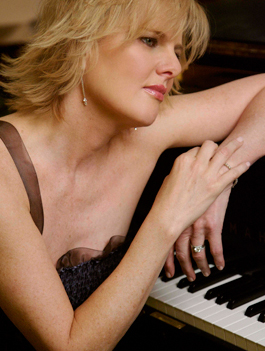
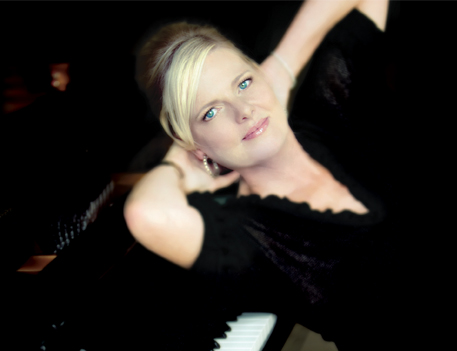
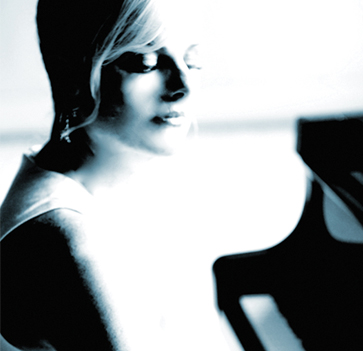
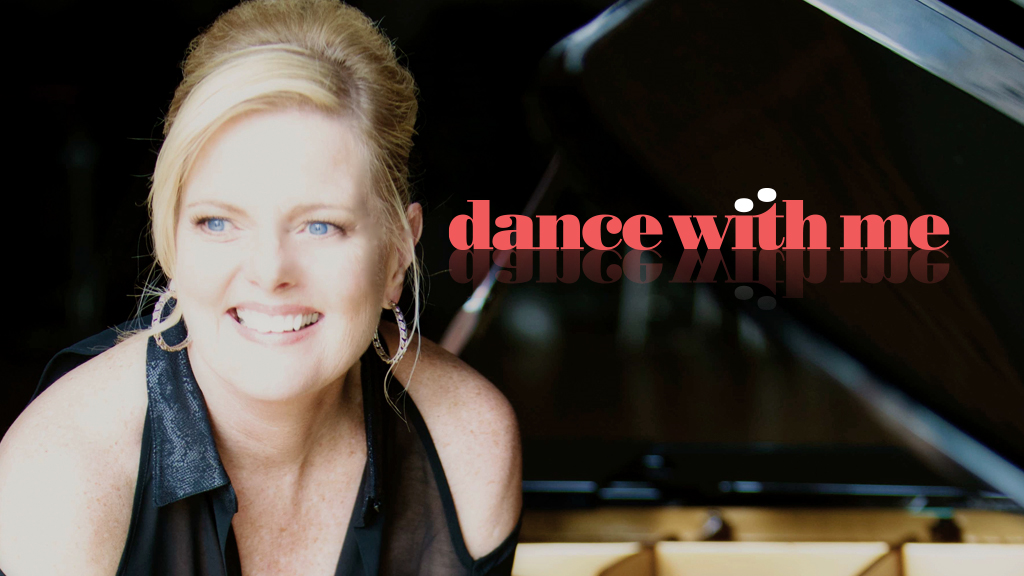
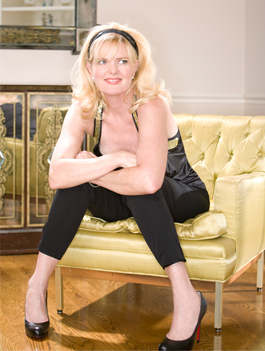 JAMES STRECKER: How did doing your recent album change you as a person and as a creator?
JAMES STRECKER: How did doing your recent album change you as a person and as a creator?
CAROL WELSMAN: This year I fulfilled a longtime dream of recording a Latin jazz album with an all-Latin band, entitled “Dance with me”. It will be released worldwide July 31, 2020. I am a jazz vocalist and pianist, and since moving to Los Angeles 20 years ago, I have always had Latin musicians in my band. I am essentially the arranger for the band; however, the musicians contribute many beautiful musical ideas to the repertoire and overall sound. My previous 12 albums have been either themed, like “JOURNEY” (songs about travel) or tributes to Benny Goodman or Peggy Lee, each containing Great American Songbook standards with swing, ballads and some Latin rhythms. This time, I wanted to create an album of songs with authentic Latin rhythms. For the first time, I gave the arranging hat to 4-time Grammy winning producer and arranger, Oscar Hernández and I’m glad I did. This music is in his soul, and I wanted to hear the songs I chose from his point of view.
As a result, the song arrangements were so exciting and musically challenging for me, so I had to really practice new musical styles like Montuno, Cha Cha Cha and Salsa rhythm piano accompaniment. Figuring out how to groove with the band (bass, drums, percussion and sax/flute) was more difficult than I imagined, since so many of the rhythmic patterns are being played by drums and percussion. Oscar was very helpful as a pianist himself, and guided me every step of the way.
I decided to adapt some Latin song classics into English for this album with my co-writer, author Jo Perry. These songs will be heard by English speaking audiences for the first time. The piece de résistance is a bilingual duet with multiple Grammy winning Latin superstar, Juan Luis Guerra. I wrote some original songs with Latin flavor for this album, and strategically chose some standards that would lend themselves well to Salsa and Mambo treatments. So, I would say this project has been the one that has changed me most as a creator.
JS: What might others not understand or appreciate about the work you produce or do?
CW: People often say that I play the piano and sing so effortlessly. I also sing in 5 languages, some only phonetically, like Portuguese. It’s challenging enough to sing in English, pouring your heart and soul into a lyric in order to send the message to the listener, let alone in other languages. Though it’s fun, and it certainly has broadened my fan base, the level of preparation and execution of these multi-lingual songs will probably always remain a mystery to many.
Playing an instrument and singing requires a certain skill in itself. But I wouldn’t have it any other way because it is wonderful to be a part of the rhythm section as well as being the vocalist. I feel this sets me apart from other vocalists, and being able to choose the color palette harmonically on the piano for each song gives my music a certain signature sound. For that I am grateful.
JS: What are the most important parts of yourself that you put into your work?
CW: My heart and soul.
JS: What are your biggest challenges as a creative person?
CW: Though I have a lot of drive generally in life, I need a creative deadline to work with, or I can be the world’s biggest procrastinator. As soon as I’m given a deadline, I can produce. This is something I really need to try and change.
JS: Please describe at least one major turning point in your life that helped to make you who you are as a creative artist.
CW: In my early twenties, basically at the beginning of my performing career, I was diagnosed with a serious vocal disorder; polyps on my vocal cords. And, I was told by the ENT that I would never regain my vocal register. Surgery was out of the question. I received a grant to study with Christiane Legrand (sister of Michel) in Paris back in the 80s, and with Christiane’s expertise in this area of vocal rehabilitation, I was able to overcome this huge hurdle and sing with a clear voice. The emotional strain was as damaging as the physical strain of simply talking, and though it was early in my career, re-learning how to breathe, talk and sing correctly was a major turning point for me. It showed me how driven I was creatively, working the next ten years on regaining my full vocal register.
A beautiful turning point in my life was living 7 years in Europe in my twenties following the studies with Christiane Legrand; four years in Paris and three in Rome. Learning both French and Italian fluently, and collecting a plethora of songs native to each culture is something that has enriched my life and career to this day.
Another turning point for me creatively was meeting Oscar Peterson. He encouraged me to follow my dream, not worrying about how much I was influenced by the pop world as a jazz artist. I feel blessed to have been invited several times to sing and play for Oscar Peterson tributes over the course of my career.
JS: What are the hardest things for an outsider to understand about your life as a person in the arts?
CW: What I have figured out over the course of my career is that people who are not in the arts seem to view the arts as a hobby; a lark. When you think of it, you watch a dancer or singer or pianist in performance, and they make it look effortless. The same can be said for acting. But again, people outside of the arts really have no idea how much work goes into developing one’s craft. Also, there are no hours for what I do. There really is very little routine in my life. Music is infinite. An idea comes for a song, maybe at 4 am. You can’t stop it and often you get up to write it down. A friend of mine who is writing a book said to me “If you’re at a dinner party and one of the guests who is a brain surgeon says he has to leave before dessert because he has surgery at 7 am, people completely understand. If you are a guest and tell them you have to go to finish a chapter of your book, or the lyrics to a song, they might feel offended that you left early for such a frivolous reason.
Artists are self-centered. We have to be. To a certain degree I have had to really work hard at getting ahead in the business and making a living doing what I love. The competition is fierce. That means taking care of me many times before taking care of others. That can sometimes be pursued selfish to an outsider.
JS: Please tell us what you haven’t attempted as yet that you would like to do in the arts? Why the delay so far?
CW: I would love to become proficient on the guitar. Years ago, when I was studying in Paris, my friend left her guitar behind and went traveling. Under major vocal rest, I taught myself bossa novas on the guitar, by ear. Many years later, thanks to solo piano/vocal Facebook Lives since the pandemic started (Saturdays at 2pm PST at https://www.facebook.com/carolwelsmanjazz/ ), I have re-united with my guitar and will receive a Trans-acoustic classical guitar from Yamaha to play live! This should be enough impetus to start lessons and eventually play well enough to add the guitar in my concerts.
JS: If you could re-live your life in the arts, how would you change it and why?
CW: I would have preferred not to have developed polyps on my vocal cords at the beginning of my performing career. I don’t wish that road-block on my worst enemy. However, it gave me such a deep understanding of how to recover from the condition, that I am going to start an online course for people with similar vocal ailments, working one on one over Zoom or Skype.
JS: Let’s talk about the state of the arts in today’s society, including the forms in which you work. What specifically gives you hope and what specifically do you find depressing?
CW: With live performances at a complete standstill due to the COVID 19 pandemic, for the foreseeable future, I am using any spare time to develop the curriculum for teaching vocal rehabilitation. It is something that is very rewarding, and it gives me hope because I know there’s a lot of need for it among those who use their voice for their vocation; i.e. singer, teachers, public speakers etc.
What gives me hope is I can do concerts by myself. With the eventually re-opening of the world, I’m told that the smaller the group format, the more concert opportunities there will be. What is depressing is knowing that we are almost in an economic depression, and it will be a long time before things are back to “normal”.
JS: In your creative life thus far, what have been the most helpful comments you have heard about your work?
CW: Of all the songs we record and play, the fans tell me they love the ballads and Latin rhythms. This is invaluable information. My Japanese jazz promoter/producer actually acted on this and produced my first solo piano/vocal album in 2016. He chose all the music, knowing which songs were most popular in Japan. The album, “This is Carol – 20 Love Songs” was the #1 selling jazz album at retail for 6 months in Tokyo and my guitarist and I enjoyed a 15-concert tour of Japan. He followed it up with Volume 2 which was released last year, and it was the #1 selling album of 2019 in Tokyo.
